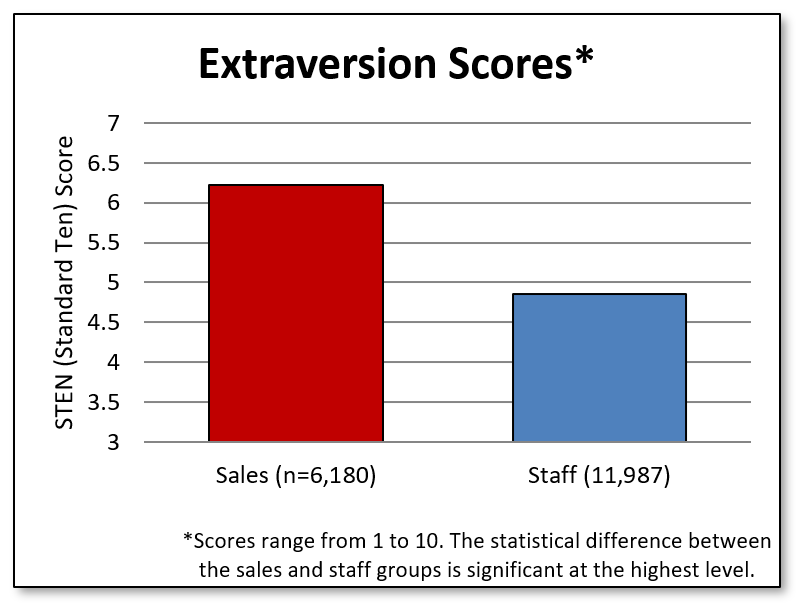 Although there are many different types of sales jobs, conventional wisdom holds that extraverts are likely to gravitate towards “sales†and introverts are more inclined to seek out “staff†roles (e.g., finance/accounting, IT, administration, etc.). An analysis of average scores of large samples of people in these broad categories verifies this observation, as the chart below illustrates. This is not to say that a person will not be successful in a sales job if he/she has a low score on extraversion nor is it to imply that extraverts will automatically be successful. However, it does affirm that people in sales jobs are likely to score higher on this measure than will people in staff positions.
Although there are many different types of sales jobs, conventional wisdom holds that extraverts are likely to gravitate towards “sales†and introverts are more inclined to seek out “staff†roles (e.g., finance/accounting, IT, administration, etc.). An analysis of average scores of large samples of people in these broad categories verifies this observation, as the chart below illustrates. This is not to say that a person will not be successful in a sales job if he/she has a low score on extraversion nor is it to imply that extraverts will automatically be successful. However, it does affirm that people in sales jobs are likely to score higher on this measure than will people in staff positions.

eTest® was developed by licensed psychologists specifically for use as a business-oriented personality inventory to help select and develop people in organizations. The eTest®  Sales Report was designed to help select successful sales people and to help people assess their own unique combinations of personality characteristics and preferences as they relate to various sales roles. The insights presented in this report were developed empirically from an analysis of real companies, real jobs and real performance data on real people. We examined over 100 sales jobs to determine their underlying dimensions, then analyzed the responses of over 3000 sales people in forty-seven different companies to identify recurring themes.
There is no one best sales profile for all jobs but there are certain traits and behaviors that increase the chances for success in most sales jobs. Our research showed that sales people and sales jobs themselves can be described along four major dimensions:
- General Sales Similarity (an overall scale indicating how similar the person is to people in a very wide range of sales jobs)
- Account Acquisition (the traditional hunter-farmer preference)
- Strategic Selling (important in developing complex solutions for clients)
- Team Coordination (necessary for marshalling an array of resources for the client)
In combination with in-depth information about the Big Five personality factors and the empirically derived scales mentioned in the Interview Guide, the Sales Report describes a candidate’s Interpersonal Style, Motivational Makeup, Problem-Solving Approach, Sales Leadership Style, Probable Assets, Potential Liabilities and Development Suggestions.
The generic eTest® business profile and the more specific sales report can help people make better employment and business decisions that help companies save money and avoid bad hires. In addition, we continue to conduct research on personality as it relates to sales effectiveness. Our process of customization adds greater depth of insight and extra layers of legal protection that results from developing and using a validated job-specific selection and developmental instrument. Get in touch with us if you would like more detailed information on the customization and validation process, or if you have other research, insights or anecdotes concerning personality and sales effectiveness.